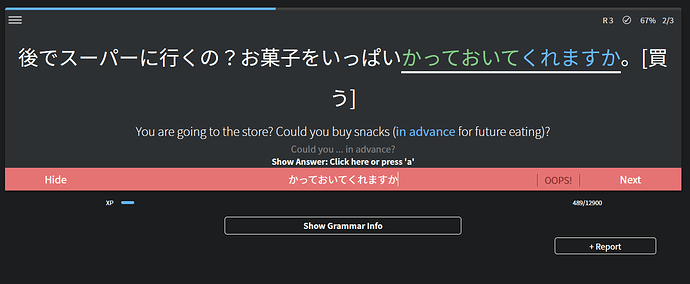@pasi Check these out:
Volitional form
https://www.bunpro.jp/grammar_points/121
https://www.bunpro.jp/grammar_points/70
Thanks, so it’s casual volitional. I guess my “Kim Tae path diagnosis” was correct.
Hello. I have a question on the sample question
Could I have two of the colas that were being chilled (in advance ) in the refrigerator?
I don’t understand where the ていた comes from in this translation, ひやしておいていた. Is this because in the past the colas were in the state of being refrigerated? Sorry I’m not sure how to wrap my head around this.
Thanks everyone
I think this grammar point might help
It’s basically a past continuous.
You can also see this if you think of ていた as the past form of ている, which is pretty close to the present continuous.
So in your case, someone put the colas in the fridge in the past, took them out in the past, and now they’re standing on a table somewhere.
Now, you are pointing to those colas that were being cooled a few moments ago, and asking for them. They’re probably still cold, you’re just specifying that they have been in the fridge before this.
I’m studying with Nihongo Sou Matome (N4) and it says that ておく can also express maintaining the current situation: ドアを開けておいてください。Is there a lesson in bunpro for that? I couldn’t find it.
Could you add on the grammar page that おく is a verb? It might seem obvious but it would be beneficial to include that information.
In までに漢字を30字おぼえておかなくてはいけない , I was thrown because the English given was “I have to…”, and I incorrectly used the causative rather than just the regular -te form of “to memorise” - I’m wondering how the “have to” is implied in this sentence?
Causative | Japanese Grammar SRS
to make・let・have somebody do something
Causative in English using the word “have” needs someone as an object.
I’ll have you memorize this…
He had me memorize this…
– Someone pushes/forces someone else to do something
→ I’m doing this because someone made me do it
なくてはいけない | Japanese Grammar SRS
must do・have to do
With this English, “have to do” is expressing an obligation to do something by a rule/morality/belief, not necessarily by someone.
I have to memorize this [for the test]…
He has to memorize this [for his job]…
– A situation created a need to do something
→ I’m doing this because I feel I must do this (not necessarily because someone is looking over my shoulder)
Ohh of course, I’m used to having to use that grammar point in full, I only glanced at the ending of the sentence and didn’t even clock that it’s -てはいけない grammar.
Hi, I have a question to the bunpo masters.
I don’t get why in this sentence, you have to use the て form - so おいて - in the end. It that compulsory? why is it wrong to put おく?
後でスーパーに行くの?お菓子をいっぱい買 っておいて 。
Thank you!
To me that reads like a casual imperative. Translated: “Will you go to the store after? Buy lots of treats.” You can’t use dictionary form in a case like that.
Ah I see, it makes sense! thank you
Hey there! In this sentence, おく cannot be used because the speaker is asking the person they are talking to for a favor. The て used here is this, which is the casual shortened form of てください. However, おく can be used if the speaker was the one buying a lot of snacks.
後でスーパーに行くの?お菓子をいっぱい買っておいて。You are going to the store? Can you please buy a lot of snacks for me?
私は後でスーパーに行くから、お菓子をいっぱい買っておく。Because I am going to the supermarket later, I am going to buy a lot of snacks in advance.
brilliant, thank you!
I have a quick question about the sample sentence:
来週までに漢字を30字おぼえておかなくてはいけない。[覚える]
Which is discussed above and I do see that it’s a double negative. My question is just what if you left that off entirely making it
来週までに漢字を30字おぼえておか
How would that change the sentence? Would it still mean the same thing, would it just be wrong? Or would it make it open ended by not saying the end? I get the ending basically means “have to do”, but I’m just checking how necessary it is
This one would just be wrong, but there are other ways to abbreviate, for example the ones covered in the なくちゃ-なきゃ grammar point. Leaving out the part after the と in the ないと grammar point is also common. All of these abbreviations basically work like what you’re suggesting, leaving out the end because it’s generally understood what it is.
You can’t just remove the なくてはいけない part because いけない(行けない) has it’s own meaning , something which is not good or shouldn’t be done etc. いけない can also be used on it’s own as an exclamation or scolding someone. If you want to get rid of the double negative you’d need something like おぼえておいてはいける but that probably doesn’t have the same connotation.
@nekoyama @EbonyMidget
You both have very cool names, almost as cool as my username.
Thank you for explaining that to me I wasn’t sure. I did think it’d just make the sentence directly incorrect but I wanted to check with people 
ありがと~~~
Hello, I’m really struggling to get this grammar nailed down.
This is the example sentence:
冷蔵庫で__________コーラを二つください。(冷やす)
Could I have two of the colas that were being chilled (in advance) in the refrigerator?
How do I know which form to conjugate first for the answer? Does ている or ておく get added to 冷やす first?


